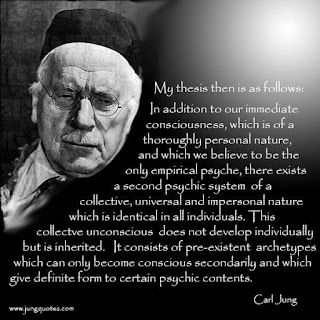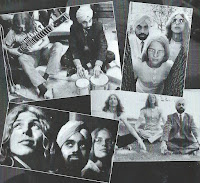Saturday afternoon: I am listening again to Van Morrison’s most recent album Latest Record Project. This was prompted by seeing Van in Oxford last week when he sang five of the songs from that album. I don’t mind hearing the new songs, but if it was up to me to decide the setlist my choices might be Duper’s Delight, Tried To Do The Right Thing, It Hurts Me Too, A Few Bars Early and especially Psychoanalysts’ Ball. I think that last song is my favourite on the album. As well as sounding great I also like the interesting lyrics which mention Freud and Jung, ‘Who's got the ball, is it Freud or Jung? or are you just too high strung? or could it be low self-esteem? Then can we analyse your dreams?, nothing is really what it seems’. I find that quite intriguing because it isn’t the first time that Van has alluded to Carl Jung in his songs. In his 2002 song Down The Road Van sings, ‘And I got to be so far away, Oh don't you see, All our memories, dreams and reflections, that keep haunting me’. Memories, Dreams & Reflections is a partly autobiographical book by Jung and an associate Aniela Jaffé which was first published in Germany in 1962 and an English translation appeared in 1963.
I had a paperback copy of this book back in the mists of time, many years ago. I can’t remember if I read it or not. Maybe it was a college book that I was supposed to study, but it shows to me that Van has been influenced by reading Jung over a long period. I have also noticed that he has mentioned Jung in several interviews over the years. In an interview with the Financial Times in 2017 Van was talking about the media and how they misrepresent him.
“It’s what Carl Jung calls projection. They are projecting ideas on to a person they don’t really know, because of something in them. A lot of people project on to me what they think fame is, or they think what I am or what I represent is. That was taken up by the people who write in the rock magazines, “I find them limited in their knowledge of music. I’ve always found that. Whereas in jazz magazines, and blues magazines and classical magazines they’re not as limited, because they have to know what they’re writing about. In rock or pop they don’t really have to know anything. You can just walk in off the street and start writing".
 |
| The Way Jung Lovers Do. |
Van said in another conversation that I read, “I’ve had
that experience, this ‘channeling’ thing. It’s a great idea and it’s one that
we all bought into for a minute, back in the 70s. A lot of these ‘new age’
ideas were floating around for a while. I don’t really go for it now. I think
it’s all down to you, if you create a song from basically nothing. I mean, you
can get ideas and inspiration from various places, from what Jung called the
collective unconscious, in dreams etc, so that’s all part of it”. In
another interview Van said, “There was a lot of change around that time –
1966/67 – and I was trying to get in everything that was going on. I had a
feeling when I was writing Astral Weeks that I was plugging into what Jung
called the Collective Unconscious”.
That might hint at the meaning of, 'If I ventured into the slipstream, between the viaducts of your dreams'. I was talking about this myself a couple of weeks ago when I wrote a little piece called The Clicking Clacking Of High Heeled Shoes. In Jungian psychology the collective unconscious is the part of the unconscious mind which is derived from ancestral memory and experience and is common to all humankind, as distinct from the individual's unconscious. That is why I think Van must sometimes wonder to himself, why must I always explain? because probably even he doesn’t understand where some of his songs come from, it could be from dreams, or the subconscious mind. What James Joyce would call stream of consciousness. I must say though that I think those types of songs are Van’s best songs, much better than when he sits down to write a rant about how badly he has been ripped off. In the Ritchie Yorke Project Interview of April 21, 2015, Van said, “There's novel reading, and then there's the other kind of reading. Take somebody like Carl Jung, the psychiatrist - now there's somebody worth getting into. With novels, I'm kind of fly by night. It isn't something I can be really consistent with”.
Van has always known that music has healing properties, that is why several songs are about healing. What he wants to understand is why music heals, and has spent a lot of time trying to find the answer. He even organised a weekend course in 1987 at Loughborough University called The Secret Heart Of Music in order to explore this very subject. In the Village voice 2009 he said, “If you study psychology and philosophy, and you look at various types of religion, what you find out is that people call this these different names, “Carl Jung would look at it one way, and Alfred Adler would look at it another way. Aristotle would maybe look at it a different way, Sartre would look at it some other way, and Beckett would look at it a different way. If you go through all this, what I end up with is energy, and I can’t name it, and no one can really say what this energy is, so the healing thing is tapping into that energy, because I can’t find a name for it, and I can’t find it in any books. There was a time when I read everything I could get my hands on because I was looking to find out what this is, is anybody writing about this energy? not really.”
I thought of buying a copy of Man And His Symbols by Carl Jung to find out more about what Van is on about, but I didn’t in the end because I thought that I would probably just read a few pages and lose interest, which often happens with me. I did watch a fascinating interview with Jung though when he talked to John Freeman in a 1959 BBC TV programme called Face To Face. I have shared it below if you want to see it. I was pleased to see that Jung wasn’t a stuffy intellectual professor type at all, but came over as a kindly, humorous, friendly, sort of a person who answered the questions in a simple open way. One thing I really liked was when Freeman asked Jung if he believed there was such a thing as God. Jung replied, “I don’t have to believe it, I know it”. Anyway, I can’t think of anything else to say now about Van and the father of analytical psychology, but I urge you to watch the video interview with Jung because I found it very interesting indeed.
 |
| Viaducts Of Your Dreams. (By Mal) |

















